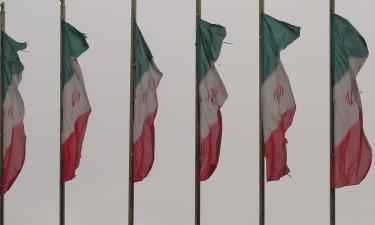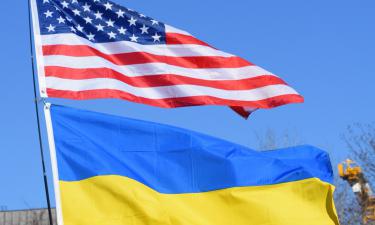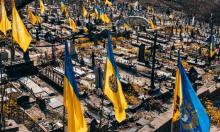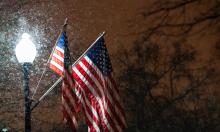U.S.-led force launches major attack on al-Qaida in Iraq stronghold, major test for Iraqi soldiers
About 3,500 U.S. and Iraqi troops backed by warjets launched a major attack Saturday against an insurgent-held town near the Syrian border, seeking to dislodge al-Qaida and its allies from a western bastion and seal off a key route for foreign fighters entering the country.
U.S. officials describe the town of Husaybah as the key to controlling the volatile Euphrates River valley of western Iraq and dislodging al-Qaida in Iraq, led by Jordanian terror mastermind Abu Musab al-Zarqawi.
The U.S.-led force includes about 1,000 Iraqi soldiers, and the offensive will serve as a major test of their capability to battle the insurgents. That is key to enabling Washington to draw down its 157,000-strong military presence in this country.
Thunderous explosions shook Husaybah early Saturday as U.S. Marines and Iraqi scouts, recruited from pro-government tribes from the area, fought their way into western neighborhoods of the town, 320 kilometers (200 miles) northwest of Baghdad, residents said.
As fighting continued throughout the day, U.S. jets launched at least nine airstrikes, according to a U.S. Marine statement. The U.S. command said there were no reports of casualties among American or Iraqi government forces. However, the military said Saturday that three more U.S. troops had been killed elsewhere in Iraq.
One soldier was killed Friday by small-arms fire south of Baghdad, and another died the same day when the vehicle in his patrol was hit by a mine near Habaniyah, 80 kilometers (50 miles) west of the capital. Another soldier was killed Saturday in a traffic accident in southern Iraq, the command said.
Those deaths raised to at least 2,045 the number of members of the U.S. military who have died since the beginning of the Iraq war in March 2003, according to an Associated Press count. Five Iraqi police commandos were killed Saturday and three wounded when a roadside bomb exploded in northern Baghdad, hospital officials said.
U.S. commanders hope the Husaybah offensive, codenamed "Operation Steel Curtain," will restore control of western Anbar province ahead of the parliamentary election Dec. 15 and enable Sunni Arabs there to vote.
Sunni Arabs form the vast majority of the insurgents, and U.S. officials hope that a strong Sunni turnout next month will encourage many of them to lay down their arms and join the political process.
However, some Sunni Arab politicians and tribal leaders complained that the Husaybah operation was endangering civilians in the overwhelmingly Sunni area and could lead to greater instability throughout Sunni areas of the country.
Husaybah, a poor Sunni Arab town of about 30,000 people, is the first stop in a network of communities which the U.S. military believes has been used by al-Qaida to smuggle fighters, weapons and explosives from Syria down the Euphrates valley to Baghdad and other cities.
Many of Husaybah's residents were believed to have fled the town after weeks of fighting between Iraqi tribes which support the insurgents and those that back the government. The U.S. military believes foreign fighters comprise only a small percentage of the insurgent ranks, which also include supporters of Saddam Hussein and Sunni Arabs opposed to the Americans and their Shiite and Kurdish allies.
However, foreign Islamic extremists are believed behind many of the spectacular suicide attacks that have killed hundreds of Iraqis in recent months. Foreign extremists are also believed more likely to continue the fight regardless of whether Iraqi Sunnis gain a measure of political power in the coming election.
Most Sunni Arabs boycotted the Jan. 30 election of Iraq's current interim parliament, but many members of the minority voted in the Oct. 15 referendum that adopted the country's new constitution. Many Sunnis also plan to vote in the Dec. 15 ballot in an effort to increase the low number of seats they control in the National Assembly, now dominated by Shiites and Kurds.
In Baghdad, Fakhri al-Qaisi, a prominent Sunni politician running on a hardline ticket was shot Saturday as he was driving home. Doctors at Yarmouk Hospital reported he was in critical condition.
Meanwhile, suspected insurgents shot and killed a Palestinian working as a security guard in Beiji, 250 kilometers (155 miles) north of Baghdad, police said. Iraqis and others working for the Americans are frequent targets of insurgent attacks.
Al-Qaida in Iraq warned this week that foreign diplomats should leave Iraq or face attacks. The militant group also threatened to kill two kidnapped Moroccan Embassy employees who disappeared Oct. 20 while driving to Baghdad from Jordan.
Today Arabic language Al-Arabiya TV showed interviews with the families of the Moroccans, begging for their release, AP reports.
A.M.
Subscribe to Pravda.Ru Telegram channel, Facebook, RSS!




